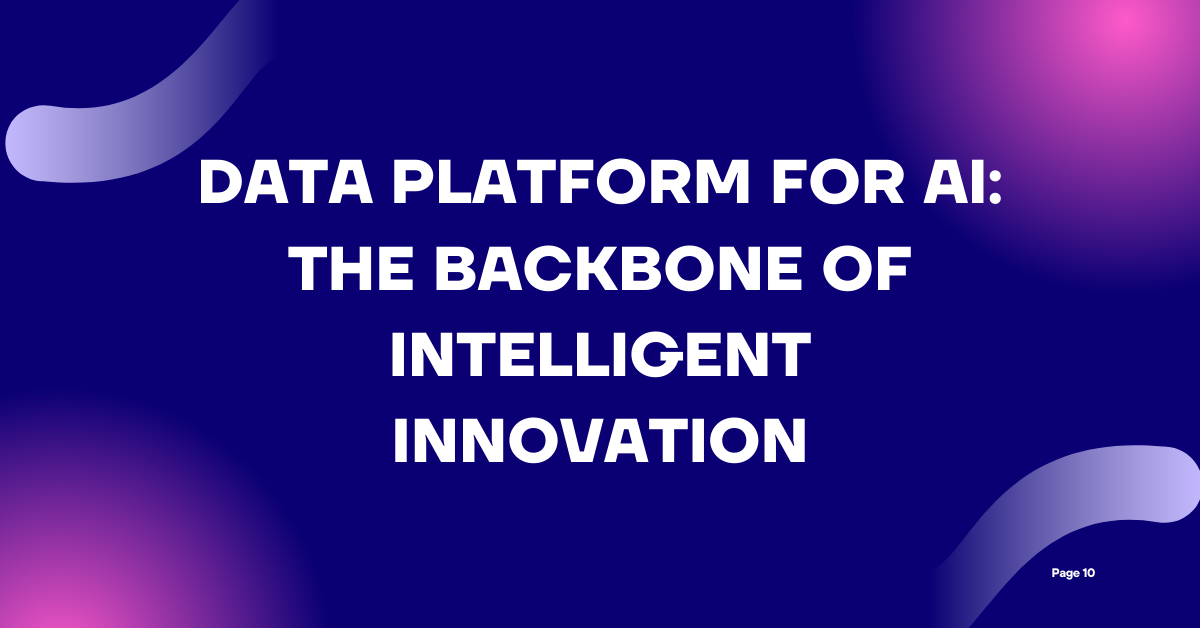In today’s world, artificial intelligence (AI) is real and changing industries. But what makes these AI systems work? The answer is a strong data platform for AI. Without it, even top algorithms are useless. This article explores what a data platform for AI is, why it’s key, and how it boosts AI for your business.
What is a Data Platform for AI?
A data platform for AI is a central system for collecting, storing, processing, and analyzing data. It’s the base for AI insights, helping businesses make smart decisions, automate tasks, and innovate quickly.
Imagine it as AI’s nervous system. It connects data sources, ensures data quality, and provides the right info at the right time. It’s behind the scenes for tasks like training chatbots, predicting customer behavior, or optimizing supply chains.
Why is a Data Platform Critical for AI Success?
1. Data is the Lifeblood of AI
AI models need data to learn, adapt, and get better. Without a solid data platform, companies face big challenges like:
- Poor data quality: Bad or missing data means AI won’t work right.
- Data silos: Separate systems make it hard to share and use data.
- Scalability issues: Old systems can’t handle today’s big data.
A good data platform fixes these problems, making sure data flows smoothly and is easy to get to.
2. Real-Time Insights Drive Competitive Advantage
In today’s fast market, being able to process data in real time is a must. A data platform for AI lets businesses:
- Analyze data as it comes in (like from IoT devices or social media).
- Spot trends and oddities right away.
- Meet customer needs before they even ask.
For example, Netflix uses its platform to suggest movies in real time, keeping viewers happy and reducing the chance they’ll leave.
3. Cost Efficiency and Scalability
Building and keeping AI models can cost a lot. A data platform helps save money by:
- Making data work flow automatically.
- Lowering the cost of storing and processing data.
- Growing with data without a hitch.
A McKinsey report shows companies that invest in advanced data platforms see a 20-30% higher return on AI efforts.
Key Components of a Data Platform for AI
A solid data platform for AI has several key parts:
1. Data Ingestion
This is about getting data from different places, like databases, APIs, sensors, and cloud apps. Tools like Apache Kafka and AWS Kinesis are used for getting data in real time.
2. Data Storage
Storing lots of data needs scalable solutions like:
- Data lakes: For raw, unsorted data (like Amazon S3, Azure Data Lake).
- Data warehouses: For sorted, processed data (like Snowflake, Google BigQuery).
3. Data Processing
This step cleans, changes, and gets data ready for analysis. Apache Spark and Hadoop are popular for handling big data.
4. Data Governance
Keeping data quality, security, and rules is key. A data platform must have:
- Data lineage tracking.
- Access controls.
- Rules for following laws like GDPR and CCPA.
5. AI/ML Model Integration
The platform should work well with AI/ML tools like TensorFlow, PyTorch, and Scikit-learn. This makes training and using models easy.
Real-Life Examples of Data Platforms Powering AI
1. Uber’s Michelangelo Platform
Uber’s Michelangelo platform is key to its AI features. It handles surge pricing, ETA predictions, and fraud detection. This centralizes data and automates tasks, giving Uber real-time insights.
2. Spotify’s Data Infrastructure
Spotify uses its data platform to understand user behavior. It recommends playlists and targets ads. This has kept over 400 million users engaged.
3. Healthcare: IBM Watson Health
IBM Watson Health gathers patient data for AI diagnostics and treatment plans. It has changed healthcare, improving patient care.
How to Choose the Right Data Platform for AI
Choosing the right data platform is key. Consider your business needs, budget, and technical skills. Here’s a checklist:
- Scalability: Can it handle your data now and in the future?
- Integration: Does it work with your tools and systems?
- Security: Does it meet industry standards?
- Ease of Use: Is it easy for both tech and non-tech teams?
- Cost: Does it fit your budget without cutting corners?
Popular choices include Google Cloud AI Platform, Microsoft Azure AI, and Databricks.
The Future of Data Platforms for AI
AI is evolving, and so are data platforms. Trends include:
- Edge Computing: Processing data closer to the source for quicker insights.
- AI-Driven Data Platforms: Using AI to manage data tasks.
- Unified Data Ecosystems: Combining data lakes, warehouses, and streaming into one.
Gartner predicts by 2025, 70% of companies will focus on small and wide data. This will lead to more accurate AI models.
Actionable Takeaways for Your Business
- Audit Your Data Infrastructure: Find areas for improvement.
- Invest in Scalable Solutions: Choose platforms that grow with you.
- Prioritize Data Quality: Clean, accurate data is essential for AI success.
- Train Your Team: Give your team the skills to use the platform well.
- Start Small, Scale Fast: Test AI projects first to show their value.
Conclusion: Unlock the Power of AI with the Right Data Platform
A data platform for AI is more than a technical need—it’s a strategic asset. The right platform unlocks AI’s full power, driving innovation and keeping you competitive.
Ready to boost your business with AI? Begin by building a strong data platform today. Share your thoughts in the comments or subscribe to our newsletter for more AI and data insights.
Suggested Multimedia:
- Infographic: “How a Data Platform Powers AI”
- Video: Case Study of a Successful AI Implementation
- Table: Comparison of Top Data Platforms for AI
